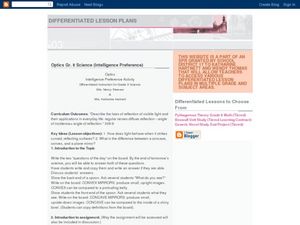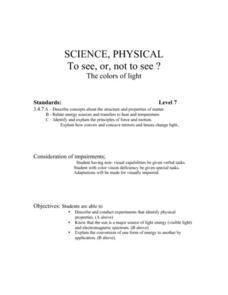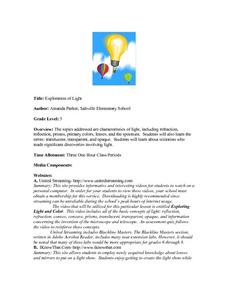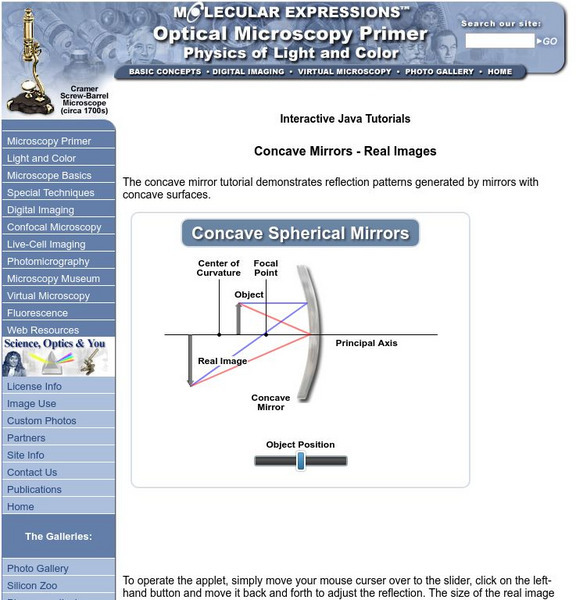Curated OER
Comparison of Images Formed by Plane, Cylindrical, and Spherical Mirrors
Students observe how reflections differ in various types of mirrors. For this reflection lesson, students use cylindrical mirrors, plane mirrors, and concave mirrors to observe how each reflects the student's face.
Curated OER
Optics- The Study of Light
In this optics learning exercise, students read about refraction and reflection, lenses and mirrors, and objects and images. They answer 13 matching questions about light rays, light behavior and types of lenses. They also answer 9...
Curated OER
Optics - The Study of Light
In this optics worksheet, students read about how light can reflect or refract and how lenses and mirrors work. Then students complete 13 matching, 27 fill in the blank, and 8 word problems.
Cornell University
Beam Focusing Using Lenses
Explore optics using an inquiry-based experimental approach! Young scholars use a set of materials to design and build a unit capable of focusing a beam of light. They experiment with different lenses to determine the best approach to...
Science 4 Inquiry
Trick or Science: Catching the Light
Your class might be surprised to learn that mirrors have been around since the first century AD! Young scientists explore reflection and refraction of light through a series of challenges. They use this knowledge to design their own...
Curated OER
Comparison of Images Formed by Plane, Cylindrical (concave side), and Spherical (concave side) Mirrors
Students study mirrors and see how images can be reversed. In this reflection lesson students demonstrate that all mirrors reverse images and that the apparent right to left reversal in a plane mirror is a result of that reversal.
Cornell University
Building a Compound Light Microscope
What better way to learn how to use a microscope than building your own? A lab investigation has scholars use lenses from magnifying glasses and sheets of cork to design their own compound microscopes. They calculate focal length and the...
Curated OER
Light and Optics
Third graders utilize the scientific method to explain light and optics in this five lessons unit. Through experimentation and discussion, 3rd graders canvass the concepts of light traveling, reflection and refraction.
Curated OER
Lenses and Mirrors
Students investigate lenses and mirrors showing how they bend and reflect light waves.
Curated OER
REFLECTIONS OF SCIENCE
Students discover the different types of mirrors, their properties and some of their applications. They have already been introduced to some of the properties of light and have already experienced some of the different types of mirrors...
Curated OER
Extreme Flashlight Tag
Fifth graders view a Powerpoint show about reflecting light. They experiment through a reflection simulation on the internet. Students complete the activity by using mirrors and light to complete send light to a specified spot.
Curated OER
Intelligence Preference
Eighth graders describe how light behaves when it strikes a surface. In this physics lesson, 8th graders investigate how the different types of mirrors reflect light. They work with their chosen group on a task they selected.
Curated OER
Light - Stop Faking It!
This well-designed presentation covers many important aspects of the science behind light. In it, pupils view slides that have a lot of the important vocabulary associated with science, slides of famous scientists who made important...
Dick Blick Art Materials
Have a Ball!
M.C. Escher's "Hand with Reflecting Globe" and the work of Dick Termes, inspire this activity. Kids check out their reflection in a Christmas ornament or a bubble filter and recreate this distorted image on a vinyl ball.
Curated OER
To See or Not to See: The Colors of Light
Seventh graders describe and conduct an experiment that identifies the physical properties of light. They explore sources of visible light and an electromagnetic spectrum. Students explain the conversion of one form of energy to another.
Curated OER
Microscopes, Telescopes, and Cameras
In this lenses worksheet, students will explain how microscopes work by completing 4 short answer questions. Students will compare refracting telescopes with reflecting telescopes by writing the terms given under the correct column. Then...
Curated OER
Light and Optics
In this light and optics activity, students match the light and optics vocabulary with their definitions. Students match 21 words to their definitions.
Curated OER
Applied Science - Physics (5B) Post Lab
Fifth graders analyze optical images. in this optical lesson, 5th graders look at how light reflects and refracts. They discuss different types of lenses and how they change the picture that is taken.
Curated OER
Exploration of Light
Fifth graders observe the video, Exploring Light and Color. They access a website to create their own light show. They conduct lab experiments to investigate refraction, reflection,and other light-related topics.
Curated OER
Microscopes and Telescopes
Students analyze a microscope and study what they do. In this investigative lesson students study how microscopes were first invented, and how ray diagrams are used in conjunction.
Curated OER
Reflection & Refraction
In this online interactive reflection and refraction worksheet, students respond to 7 multiple choice and fill in the blank questions regarding the information included in the provided paragraphs.
Physics Classroom
The Physics Classroom: Lesson 3: Concave Mirrors
Lesson 3 of this tutorial on refraction is on concave mirrors. Content that is covered includes the anatomy of curved mirrors, reflection of light and image formation, ray diagrams, image characteristics for concave mirrors, plus more.
Florida State University
Florida State University: Microscopy Primer: Concave Mirrors: Real Images
Florida State University offers an interactive Java applet demonstrating the object-image relationships for a concave mirror. The position of the object can be dragged along the principal axis and the location, orientation, and size of...
Physics Classroom
The Physics Classroom: Ray Diagrams for Concave Mirrors Case A
Ray diagrams are useful tools for determining the location of an image as produced by a concave mirror. All concave and convex mirror ray diagrams can be constructed from knowledge of the behavior of two rays. Learn here about ray diagrams.
Other popular searches
- Convex and Concave Mirrors
- Concave Mirrors Vocabulary
- Rules for Concave Mirrors
- Physics Concave Mirrors
























